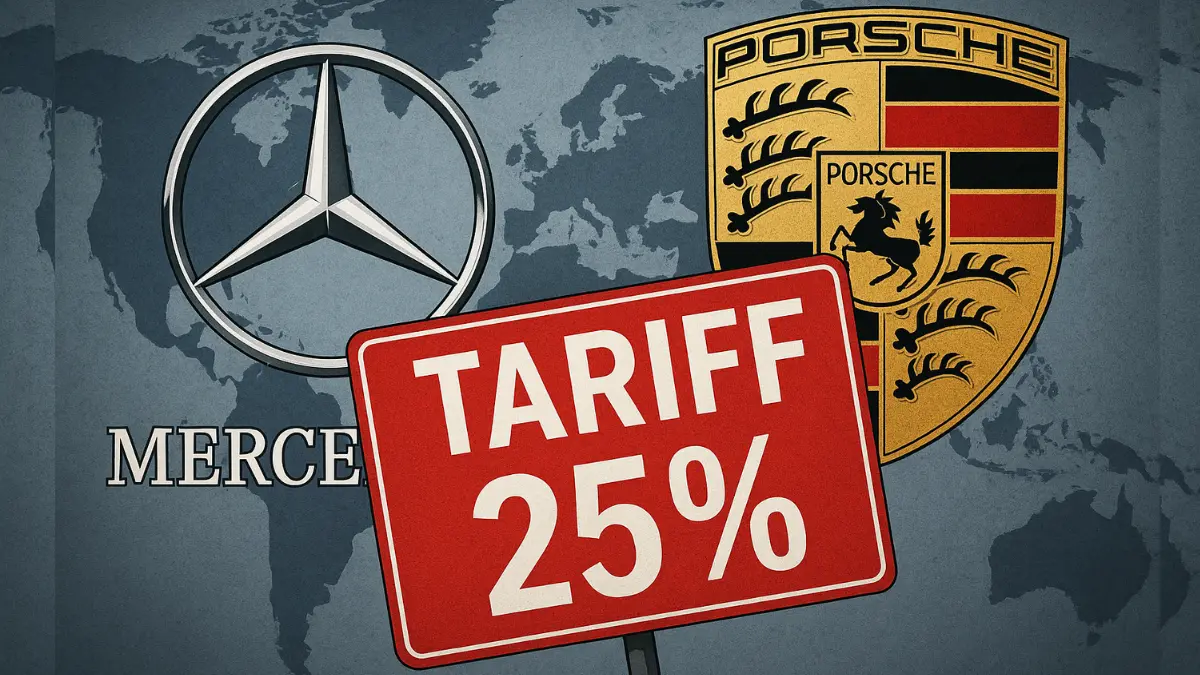Trump’s new auto tariffs are hurting German luxury brands. Learn how Trump auto tariffs impact Mercedes and Porsche in 2025 and what it means for U.S. car buyers.
Table of Contents
🔍 Trump Auto Tariffs Mercedes Porsche Impact Explained
The Trump auto tariffs on Mercedes and Porsche are causing major disruptions in global automotive markets. A 25% tariff on imported cars implemented in April 2025 has directly hit German luxury brands that rely heavily on the U.S. market. Mercedes-Benz and Porsche generate around 25% of their global sales from the U.S., and the new tariff policies are now eroding both sales and profits.
📉 Mercedes-Benz U.S. Sales Drop 12% Due to Tariffs
In Q2 2025, Mercedes-Benz reported a 9% global sales decline, selling 453,700 vehicles. But the sharpest drop was in the U.S., where sales fell 12% year-over-year. The company confirmed the Trump auto tariffs on Mercedes were a key reason for the decline.
“Deliveries to dealerships were calibrated to navigate new global tariff policies,” Mercedes said.
Sales in Germany rose 7%, while “Rest of World” markets like Africa and Latin America grew 24%. But the U.S., a major Mercedes market, took a heavy hit.
📈 Porsche’s Pre-Tariff Trick Masks Pain
Unlike Mercedes, Porsche’s U.S. sales rose 10% in Q2. But this increase was fueled by pre-tariff inventory and temporary price protection offered to American buyers. Essentially, Porsche absorbed tariff costs, sacrificing margins for volume.
Despite the short-term bump, Porsche’s global sales fell 6%, exposing the deeper financial impact of Trump’s policies.
“The increase is mainly due to price protection before increased import tariffs,” Porsche admitted.
Read more: UnitedHealth Faces Medicare Billing Probe: What It Means for Patients, Taxpayers, and Investors
⚠️ Why Trump Auto Tariffs Hurt Mercedes & Porsche
The Trump auto tariffs Mercedes Porsche conflict is rooted in a broader trade push. Trump’s administration wants foreign carmakers to shift production to the U.S. by making imports less competitive.
Porsche is particularly vulnerable because all its production takes place in Germany and EU countries. CEO Oliver Blume has confirmed that tariff costs will be passed to U.S. customers, but no timeline has been announced yet.
Mercedes fares better thanks to its Tuscaloosa, Alabama plant, where it produces many SUVs and EVs.
“We’re committed to maintaining MY25 pricing until further notice,” a Mercedes spokesperson told Yahoo Finance .
🌍 Germany’s Auto Sector Faces Global Ripple Effects
Germany’s carmakers aren’t just facing shrinking U.S. sales—they’re also dealing with slim profit margins, depleted inventories, and geopolitical pressure.
- Volkswagen, Germany’s largest automaker, saw global sales grow 1.2%, but U.S. sales plummeted 29%
- The EU is rushing to negotiate a lower tariff deal with the U.S., similar to what the UK secured
Politico reported that the U.S. may offer the EU a 10% tariff compromise, but the deal has not been finalized.
🛒 Final Word: What Buyers Should Expect in 2025
For American buyers considering a German luxury car:
- Expect higher prices on imported models after pre-tariff stock runs out
- Fewer incentives and tighter dealer inventories are likely
- Tariff pressure may cause delays or model discontinuations in the U.S. market
Mercedes and Porsche are among the biggest names affected by the Trump auto tariffs, and while they’re managing for now, the long-term impact could reshape global production and pricing.
More Articles –
UnitedHealth Faces Medicare Billing Probe: What It Means for Patients, Taxpayers, and Investors
Goldman’s Top Trades for This Upcoming Earnings Season: What You Need to Know
